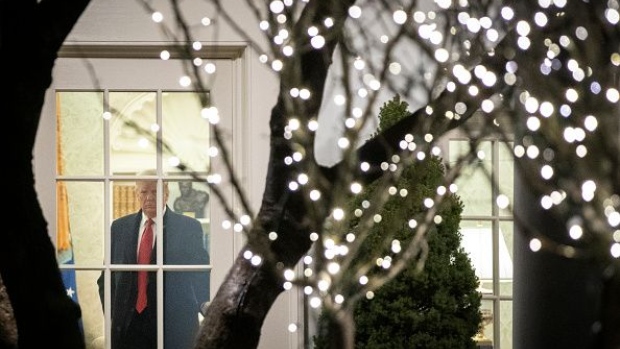Dec 11, 2019
Don’t fear the 'United States of Impeachment'
, Bloomberg News

Suppose that you believe (as I do) that President Donald Trump has abused his power and thus committed impeachable offenses. If so, you should take one concern very seriously: As the House of Representatives proceeds, there’s a risk that the nation will become the United States of Impeachment.
Fortunately, the risk is diminished by the narrowness of the current text of the two articles of impeachment that were released on Tuesday.
The first article focuses solely and narrowly on the effort to influence Ukraine to announce a criminal investigation of Joe Biden and of “a discredited theory promoted by Russia alleging that Ukraine – rather than Russia – interfered in the 2016 United States Presidential election.”
The second article focuses solely and narrowly on obstruction of Congress through Trump’s categorical refusal to respond to its impeachment inquiry.
But in the event that members of the House consider broadening the current text, or adding other articles, the risk of overreaching needs to be kept in mind -- and candidly addressed.
To see the problem, let’s begin by noting that, at least once, almost every president has been accused of some “abuse of power.”
During the Korean War, President Harry Truman seized the steel mills – and thus went well beyond his constitutional power. One of President Ronald Reagan’s most important deregulatory initiatives, involving automobile safety, was struck down as unlawful -- by a unanimous Supreme Court.
After the 9/11 terrorist attacks, President George W. Bush took steps that he lacked the authority to take, and so exceeded or abused his power as commander-in-chief. The Supreme Court invalidated one of President Barack Obama’s most important air-pollution regulations, involving mercury, as a clear violation of the Clean Air Act and an unlawful use of executive power.
For most of its history, the U.S. has benefited from an informal arms-control agreement with respect to impeachment, based on a clear social norm. Leaders of political parties have essentially said, “We won’t call for impeachment of your boss, so long as you won’t call for impeachment of ours.”
If we want to understand the history of impeachment, the numerous cases in which no serious effort was made to remove a sitting a president are at least as revealing as the very few cases in which such an effort was launched.
But in the current period, there is a strong incentive to think the worst of presidents of an opposing party – to characterize them as unfit, even demonic, and to call for their immediate removal. In some ways, “partyism” is akin to racism, in the sense that many Republicans demonstrate an automatic revulsion toward Democrats, and vice versa.
With respect to Trump, the strongest ground for impeachment, captured in the first article, is abuse of power. If the House is to impeach Trump, the challenge is to proceed in a way that doesn’t breach the longstanding arms-control agreement, or make it possible to pursue impeachment for the kinds of actions described above by Truman, Reagan, Bush and Obama.
For impeachment, what is necessary is a gross abuse of power – an exercise of authority that is not grounded in a defensible argument about what a president can legitimately do. Truman, Reagan, Bush and Obama made reasonable, good-faith arguments that they were acting within their authority. True, the Supreme Court rejected their arguments – but losing in court is hardly an impeachable offense.
As the current text of the first article signals, an abuse of power gets at the core of the impeachment clause if it is undertaken not to protect the nation but to promote the president’s self-interest, either personal or political. And if the result is to compromise the integrity of the electoral process itself, we are unquestionably dealing with an impeachable offense.
At the Constitutional Convention, Virginia’s George Mason asked, “Shall the man who has practiced corruption & by that means procured his appointment in the first instance, be suffered to escape punishment, by repeating his guilt?”
If we are speaking of (1) a gross abuse of presidential authority, (2) undertaken for either personal or political self-interest and (3) compromising the integrity of the process of self-government, we have a sufficiently defined offense, one that counts as a high crime and misdemeanor. The text of the all-important first article comes very close to saying that. It should not be broadened. If anything. If anything, it might be narrowed even further.
Republicans and Democrats are welcome to disagree on whether Trump’s actions, or those of one of his predecessors or successors, meet that three-part standard. But they should be able to agree that the standard is the right one – and that it does not threaten to create the United States of Impeachment.




